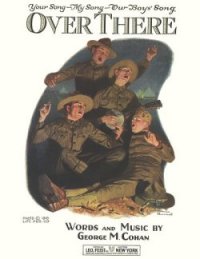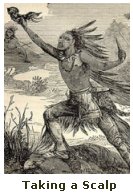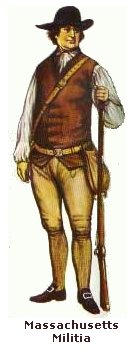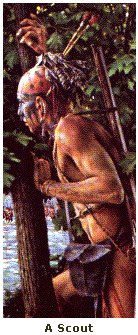Of
worthy Captain Lovewell, I purpose now to sing,
How valiantly he served his country and his King;
He and his valiant soldiers did range the woods
full wide,
And hardships they endured to quell the Indian's
pride.
'Twas nigh unto Pigwacket, on the eighth
day of
May,
They spied a rebel Indian soon after break of day;
He on a bank was walking, upon a neck of land,
Which leads into a pond as we're made to
understand.
Our men resolved to have him, and
travelled two
miles round,
Until they met the Indian, who boldly stood his
ground;
Then up speaks Captain Lovewell, "Take you
good heed,"
says he,
"This rogue is to decoy us, I very plainly
see."
"The Indians lie in ambush, in some
place nigh
at hand,
In order to surround us upon this neck of land;
Therefore we'll march in order, and each man leave
his pack;
That we may briskly fight them when they make their
attack."
They came unto this Indian, who did them
thus defy,
As soon as they came nigh him, two guns he did let
fly,
Which wounded Captain Lovewell, and likewise one
man more,
But when this rogue was running, they laid him in
his gore.
Then having scalped the Indian, they
went back to
the spot,
Where they had laid their packs down, but there they
found,
them not,
For the Indians having spied them, when they them
down
did lay,
Did seize them for their plunder, and carry them
away.
These rebels lay in ambush, this very
place hard by,
So that an English soldier did one of them espy,
And cried out, "Here's an Indian”; with that they started out,
As fiercely as old lions, and hideously did shout.
With that our valiant English all gave a
loud huzza,
To show the rebel Indians they feared them not a straw:
So now the fight began, and as fiercely as could be,
The Indians ran up to them, but soon were forced to flee.
Then spake up Captain Lovewell, when
first the fight began,
"Fight on my valiant heroes! you see they
fall like rain."
For as we are informed, the Indians were so thick,
A man could scarcely fire a gun and not some of them hit.
Then did the rebels try their best our
soldiers to surround,
But they could not accomplish it, because there was a pond,
To which our men retreated and covered all the rear,
The rogues were forced to flee them, although they skulked
for fear.
Two logs there were behind them that
close together lay,
Without being discovered, they could not get away;
Therefore our valiant English they travelled in a row,
And at a handsome distance as they were wont to go.
'Twas ten o'clock in the morning when
first the fight begun,
And fiercely did continue until the setting sun;
Excepting that the Indians some hours before 'twas night,
Drew off into the bushes and ceased a while to fight.
But soon again returned, in fierce and
furious mood,
Shouting as in the morning, but yet not half so loud;
For as we are informed, so thick and fast they fell,
Scarce twenty of their number at night did get home well.
And that our valiant English till
midnight there did stay,
To see whether the rebels would have another fray;
But they no more returning, they made off towards their home,
And brought away their wounded as far as they could come.
0f all our valiant English there were
but thirty-four,
And of the rebel Indians there were about fourscore.
And sixteen of our English did safely home return,
The rest were killed and wounded, for which we all must mourn.
Our worthy Captain Lovewell among them
there did die,
They killed Lieut. Robbins,
and wounded good young Frye,
Who was our English Chaplain; he many Indians slew,
And some of them he scalped when bullets round him flew.
Young Fullam too I’ll mention, because
he fought so well,
Endeavoring to save a man, a sacrifice he fell:
But yet our valiant Englishmen in fight were ne'er dismayed,
But still they kept their motion, and Wyman's Captain made,
Who shot the old chief Paugus, which did
the foe defeat,
Then set his men in order, and brought off the retreat;
And braving many dangers and hardships in the way,
They safe arrived at Dunstable, the thirteenth day of May.

 By the early 1720s, disputes between the French
and English regarding the territory of northern New England began to
bubble over; the Abenaki Indians, allies of the French, raided
throughout the area, killing, scalping, and capturing English
settlers. In 1724, to protect the rural settlements against
maurauding French forces and their Abenaki Indian allies, the British
constructed Dummer's Fort near what today is Brattleboro, Vermont, and
manned it with a garrison of 43 soldiers and 12 Mohawk warriors.
The Abenaki raids, however, continued, and the governments of New
Hampshire and Massachusetts subsequently offered a bounty of 100 pounds
sterling for each Indian scalp.
By the early 1720s, disputes between the French
and English regarding the territory of northern New England began to
bubble over; the Abenaki Indians, allies of the French, raided
throughout the area, killing, scalping, and capturing English
settlers. In 1724, to protect the rural settlements against
maurauding French forces and their Abenaki Indian allies, the British
constructed Dummer's Fort near what today is Brattleboro, Vermont, and
manned it with a garrison of 43 soldiers and 12 Mohawk warriors.
The Abenaki raids, however, continued, and the governments of New
Hampshire and Massachusetts subsequently offered a bounty of 100 pounds
sterling for each Indian scalp.  Reacting partly in response to the offered
bounty, Captain John Lovewell of Dunstable, Massachusetts, organized a
company of 46 militiamen to hunt the Abenaki raiding parties. The
company constructed a small fort at Ossipee, New Hampshire, and after
several moderately successful patrols, Lovewell decided to attack the
Abenaki village of Pequawket--which had served as a raiding party base
for over fifty years--on the bank of what
Reacting partly in response to the offered
bounty, Captain John Lovewell of Dunstable, Massachusetts, organized a
company of 46 militiamen to hunt the Abenaki raiding parties. The
company constructed a small fort at Ossipee, New Hampshire, and after
several moderately successful patrols, Lovewell decided to attack the
Abenaki village of Pequawket--which had served as a raiding party base
for over fifty years--on the bank of what  today is known as Lovewell's Pond near
Fryeburg, Maine. On 9 May 1725, during prayers led by the
expedition's chaplain, one of the men spotted an Abenaki scout.
The company waited patiently for him to draw near in hopes that he
could be killed or captured. When fire was finally exchanged,
both the warrior and Lovewell fell dead. On the return to
Ossipee, the company was ambushed by an Abenaki war party led by
Paugus. Ten men were killed in the first volley of Indian fire,
and the firefight continued for nearly ten hours until Paugus was
killed. Although only twenty militiamen survived the battle,
Abenaki losses were far heavier and the Indians deserted
Pequawket. Later in May, Col Ebeneazer Tyng advanced north with a
larger force, cut off the Abenaki from their French allies, and forced
them to make peace with both New Hampshire and Massachusetts.
today is known as Lovewell's Pond near
Fryeburg, Maine. On 9 May 1725, during prayers led by the
expedition's chaplain, one of the men spotted an Abenaki scout.
The company waited patiently for him to draw near in hopes that he
could be killed or captured. When fire was finally exchanged,
both the warrior and Lovewell fell dead. On the return to
Ossipee, the company was ambushed by an Abenaki war party led by
Paugus. Ten men were killed in the first volley of Indian fire,
and the firefight continued for nearly ten hours until Paugus was
killed. Although only twenty militiamen survived the battle,
Abenaki losses were far heavier and the Indians deserted
Pequawket. Later in May, Col Ebeneazer Tyng advanced north with a
larger force, cut off the Abenaki from their French allies, and forced
them to make peace with both New Hampshire and Massachusetts.